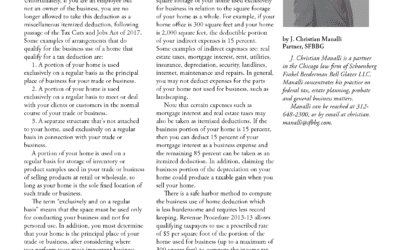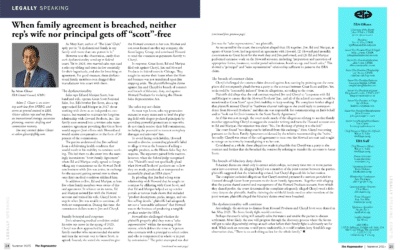Property owners are receiving reassessment notices with increases of 200% or even 300% on commercial property and apartment buildings. Even those who planned for the reassessment this year never imagined increases on this scale and do not know how to budget for the potential tax increase.
As an attorney who contests property tax assessments, I have been hearing a lot from taxpayers this year.
Townships in the north and west regions of Cook County are being reassessed in 2019 as part of the triennial reassessment cycle. All other counties in the state are also being reassessed this year on the four-year (quadrennial) reassessment cycle.
It is imperative that taxpayers watch for reassessment notices because appeals must be filed within 30 days of publication. By the time a tax bill is received, it is generally too late to contest the assessment for that tax year.
In Cook County, the assessor and the Board of Review each have a formal appeal process. So, if a taxpayer misses the opportunity to appeal to the assessor, there is another opportunity to appeal to the Board of Review.
In other counties, appeals must be filed with the Board of Review within 30 days of the assessment notice. Filing an assessment appeal to the Board of Review is a prerequisite to appeals to the Illinois Property Tax Appeal Board or the county circuit court, so if a taxpayer misses the Board of Review deadline, the right to further appeals is lost.
Illinois already has the highest property taxes of any state except New Jersey. So, when property owners see their assessments double or triple, they have good reason for concern. The new Cook County assessor, Fritz Kaegi, believes that commercial property in Cook County is underassessed and is imposing assessment increases the likes of which some taxpayers have never seen.
Assessors in other jurisdictions will soon begin to issue reassessment notices and we have yet to see how much those assessments may increase.
Everywhere in Illinois, except Cook County, the assessed value of real estate is one-third of the market value. In contrast, Cook County uses a graduated system of assessment, with residential property assessed at only 10% of market value and commercial property at 25% of market value.
In this way, most of the tax burden is shifted to commercial property owners. The property tax is determined by multiplying the assessed value by the equalization factor (or “multiplier”) and tax rate. (Tax = assessed value x multiplier x tax rate.)
The equalization factor is determined by the Illinois Department of Revenue from transfer tax declarations. Those declarations are not simply an additional tax imposed when real estate is sold. The information is used to compare assessments to sales prices.
If the Department of Revenue finds a disparity between sales prices and assessments, then it corrects the disparity by an equalization factor. In Cook County, the 2017 (last published) equalization factor was 2.9627. This means that the assessed value is multiplied by almost three times before the tax rate is applied.
The tax rate is the result of the levies of all of the taxing districts in which the real estate is located. Illinois has the most taxing districts of any state — ranging from mosquito abatement districts to school districts.
In fact, we have about 2,000 more taxing districts then even the next runner-up. In some locations, tax rates have reached 30%. The property taxes are almost as great as mortgage payments and make up most of the rent paid for commercial property. The amount of the tax burden can make or break a business.
As if assessments and taxes are not enough to worry about, taxpayers have another reason for concern. The Cook County assessor is promoting legislation that will require owners of income-producing property to turn over their financial records and tax returns every year — even if they do not file assessment appeals. Failure to comply would result in financial penalties. The proposed legislation would affect not only taxpayers in Cook County, but throughout Illinois.
The Cook County assessor wants the financial records of taxpayers to help assess real estate. The value of most income-producing property is determined by a process called capitalization.
Essentially, the net income from real estate is divided by a capitalization rate to calculate the market value. The capitalization rate reflects various factors, including mortgage interest rates and the percentage return on investment.
While financial records are typically provided with assessment appeals, the assessor wants a state law that requires disclosure of financial records and tax returns even if the taxpayer is not contesting the assessment.
The most important information for taxpayers is the fact that assessments are not set in stone. Assessment appeals can make a dramatic difference in taxes. The amount of real estate that assessors must value is enormous, so they often rely on mass assessment methods.
If taxpayers provide specific evidence of the sales prices of comparable properties or the actual net income of commercial real estate, it is possible to prove that real estate is overvalued and to reduce assessments.
Where the new owners of a shopping center were struggling, I was able to use income capitalization to convince the Board of Review to reduce the assessment even though it was already lower than the purchase price of the property.
Similarly, assessment appeals for an apartment complex produced annual savings of hundreds of thousands of dollars. Those savings may allow the hiring additional staff, improvements to the real estate or incentives to attract tenants to fill vacancies.
Most assessment agencies will also give temporary relief when vacancy rates are unusually high. The formula for relief varies, but in Cook County, the government may reduce the assessment on a building in direct proportion to the amount of vacancy. Experienced property managers and investors know that filing assessment appeals is just a part of doing business. This is especially true this year as real estate is reassessed.
Although it may offer little consolation, taxpayers should know that increases in assessment do not necessarily result in a proportionate increase in tax. If the entire assessment base is increased, but the taxing districts are not asking for more money, then in theory, the tax rate should be reduced to offset the increase in assessment.
However, this assumes that everyone’s assessments are increased proportionately. The whole assessment process is a balancing act.
For example, if the assessment of commercial real estate in Cook County is increased at several times the rate of single-family homes, then the tax burden of commercial property owners will multiply. The same is true for homeowners if their property assessment increases by a larger percentage then their neighbors.
The uncertainty is a problem in itself. Homeowners do not know how much money to put aside for taxes or whether they will be able to afford the taxes on a home they want to buy.
Commercial property owners do not know how much to charge tenants in anticipation of the taxes. Further, tenants fear a sudden bill that they may be unable to pay.
At the same time, investors cannot know whether real estate will be profitable and may refrain from investing in Illinois and, in particular, Cook County.
Economists tell us that this uncertainty will have a chilling effect on the economy as a whole.
This article was originally published in the Chicago Daily Law Bulletin. To view the article in its published format, click here.



